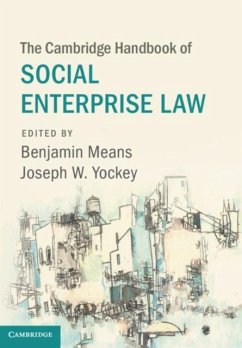Growing numbers of employees, consumers, and investors want companies to be truly good; these stakeholders will accept lower economic returns in order to support companies that prioritize sustainability, fair wages, and fair trade. Unlike charities or non-profit organizations, such companies - or social enterprises - are not only permitted but also expected to produce an economic return for investors. Yet, unlike traditional business ventures, social enterprises have no obligation to maximize profits, even on a long-term basis. In this comprehensive volume, Benjamin Means and Joseph W. Yockey bring together leading legal scholars and practitioners to offer an authoritative guide to social enterprise law and policy. The Cambridge Handbook of Social Enterprise Law takes stock of the field and charts a course for its future development. It should be read by entrepreneurs, investors, practitioners, academics, students and anyone else interested in how companies are evolving to address new demands for capitalism with a conscience.
Dieser Download kann aus rechtlichen Gründen nur mit Rechnungsadresse in A, B, BG, CY, CZ, D, DK, EW, E, FIN, F, GR, HR, H, IRL, I, LT, L, LR, M, NL, PL, P, R, S, SLO, SK ausgeliefert werden.









